Anatomy of an Era: Aaron Taylor, Part 3
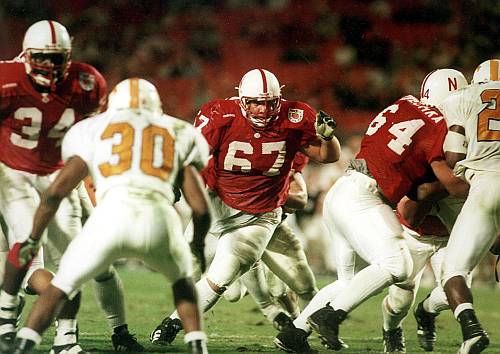
Excerpted from Chapter 56, No Place Like Nebraska: Anatomy of an Era, Vol. 1 by Paul Koch
Anatomy of an Era: Aaron Taylor, Part 3
Q: Did you have a favorite site you liked playing?
AT: I’ve got a couple. I liked playing in Missouri because the fans were so damn passionate and that was always a good game. So I liked that as far as fan-wise.
As far as stadium-wise, I really enjoyed Colorado. I always thought that was such a beautiful stadium in Boulder. I really did. Iowa State was like going to a high school stadium. It was a glorified high school stadium, but it was still fun to play in because it kind of brought you back to your past. Other than that, Kansas and Kansas State were really nothing.
Q: Did you have a place you hated going into?
AT: Yeah, I usually didn’t like going into K-State. Those guys? They were so arrogant. From the fans all the way down to the players, I just didn’t enjoy that. Also, it was fun to just pound them and go about your way. (laughs) Everybody from the announcer to the fans was talking trash about you, not really having a respect for you, your coaches, your history. They were just building history there with Bill Snyder and they wanted to sit there and degrade us and talk about us? ‘C’mon guys, you guys are doing a good job of trying to build yourself as a program, there’s no need to try and tear us down in the process. Have some respect.’
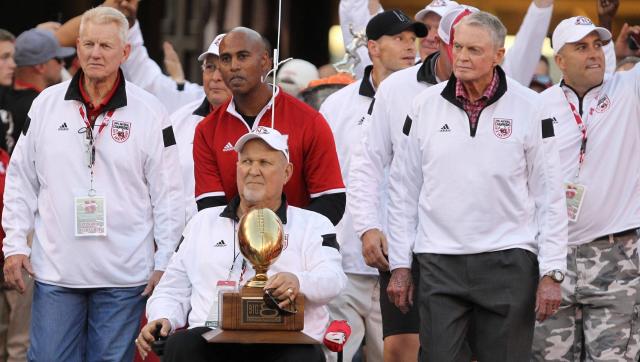
Q: Was there much smack talking out on the field?
AT: Not really. I get that question a lot. They’d talk trash to you, but we never really got talked to whole lot. It’s awful difficult to talk trash whenever you’re getting your ass kicked. (laughs)
Q: Maybe right before that first snap, but after that things changed, huh?
AT: Right. And that was the thing, too: Tenopir always taught that you always get the first lick in. Always put that doubt in their mind first.
Q: Are there any favorite practice stories?
AT: I would say, yeah: Jason Peter and I. It was our sophomore year, the spring of 1995, and we were doing a lot of one-on-ones now because the Pipeline had left and there were a bunch of new guys on the offensive line. And the defensive line was gearing up for a change, so we were doing a lot of one-on-ones in the pit. Jason makes a move on me and I, in turn, combatted that and absolutely stopped him, just handed it to him. Well, he gets mad because he’s trying to do the best he can. So I, in my mind, am going, ‘Man, I just stuck him! Hell of a deal! good job.’ Well, the next thing you know, he tees off and he punches me.
Well, I’m young and I’m still trying to prove myself, so I turn around and I punch him back. Next thing I know the fight’s on. It seemed like an eternity before it got separated. So we end up getting separated and emotions were high for the rest of the session. Well, when we go to team practice right after that we all have to walk through the same door to the field into the stadium, and Jason and I ended up walking next to each other. And he looks at me. (pause) And then he goes, “That was a good one, huh?” I go, ‘It wasn’t too bad.’ And then I go, ‘Don’t you think we could’ve not fought as long? I’m shot for the rest of practice.’ Then he said the same thing, “When we fight next time, let’s just not fight for so long.” (laughs)
So that’s what it was: a spur-of-the-moment thing. We both needed to ‘create a personality’ if you will, show our coaches, show our teammates that we weren’t going to back down, that we cared, that we had a passion, those kind of things. Yet, in turn, when it was time to get together and work for a common cause with each other we were willing to work shoulder to shoulder, hand in hand, and do it together.
Q: It’s just occurred to me: do you think maybe it was by design that Coach McBride and Coach Tenopir let you guys have at it down in the pit during the week so that maybe you wouldn’t go off on an opponent come Saturday and draw a penalty?
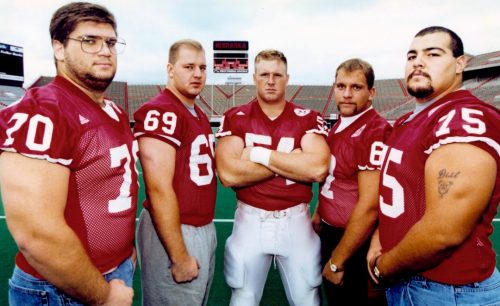
’95 Pipeline. (Courtesy Omaha World-Herald)
AT: I’m glad you brought that up, because it wasn’t just them.
I can remember this vividly: on the field, when there would be a little scuffle on the field and Coach Osborne saw it? He would turn around and walk away for about 20 seconds and watch someone else on the field, then he’d turn around and go, “Hey, hey, hey! What are you guys doing!?” like he was completely oblivious. (laughs) Then he’d make the guys go run, knowing damn well he saw every bit of it. And that’s exactly what you talked about: they would let you go and let you get fired up and let you get it out of your system and kind of do that deal. They’d condone it.
Q: You think the fights during the week prevented some dumb penalties on Saturday?
AT: Yeah, I think so. It let you get it out of your system. There was just so much testosterone flowing around there.
And not only that, but to instill some toughness. There’s a reality to that, too, that you have to be tough to play the ballgame, and they wanted to make sure that guys were ready and willing to stick up for each other. A lot of times it was sticking up for each other, and you’re the one joining in the fight for somebody else. I think there were just a lot of different variables that went into why they let it happen. They didn’t just let it happen, but they kind of let it go on for a little bit longer than it needed to. (laughs)
Q: Any memorable off-field stuff?
AT: You know, the thing that I remember the most -that I’m the most fond of- is that everyone got along. Everyone got along really well. When practice ended and we’d go back to the locker room and get showered up, then we still hung out and played cards, BS’d forever. There were times it wasn’t ’til 8:30, 9 o’clock we were actually just getting out of the stadium, from just hanging out with guys when you’re there from 1 o’clock to 9 o’clock with someone, sometimes 10 if you’re in the study hall, too. You have nothing but fondness. They become a family, they became a brother. You know what that person’s feeling, what gets ’em going, what makes ’em depressed, you become their best friend, their brother.
Q: And I’ve got to ask you, Tommie wasn’t the most social guy, was he?
AT: Oh, not at all.
Q: But that was just Tommie, right?
AT: That was just Tommie, exactly right. Tommie was social on his own terms, but it wasn’t an arrogance. There was a little bit of arrogance -because we all have it- but there wasn’t really any disrespect. There was so much pressure on Tommie that we all kind of understood it.
Not the most sociable guy, but he was a hell of a leader and he expected perfection out of everyone. I remember being in the huddle with him -and I was just a young pup- and it didn’t matter who you were, he would ride you. But the beautiful thing about Tommie, when the game was on the line? When you had third or fourth down and a yard or two to go? He was willing to put that pressure upon himself and make the play and show you he could get it done, and that’s why he expected excellence out of you. A hell of a leader. Not the most sociable guy; I never hung out with him.
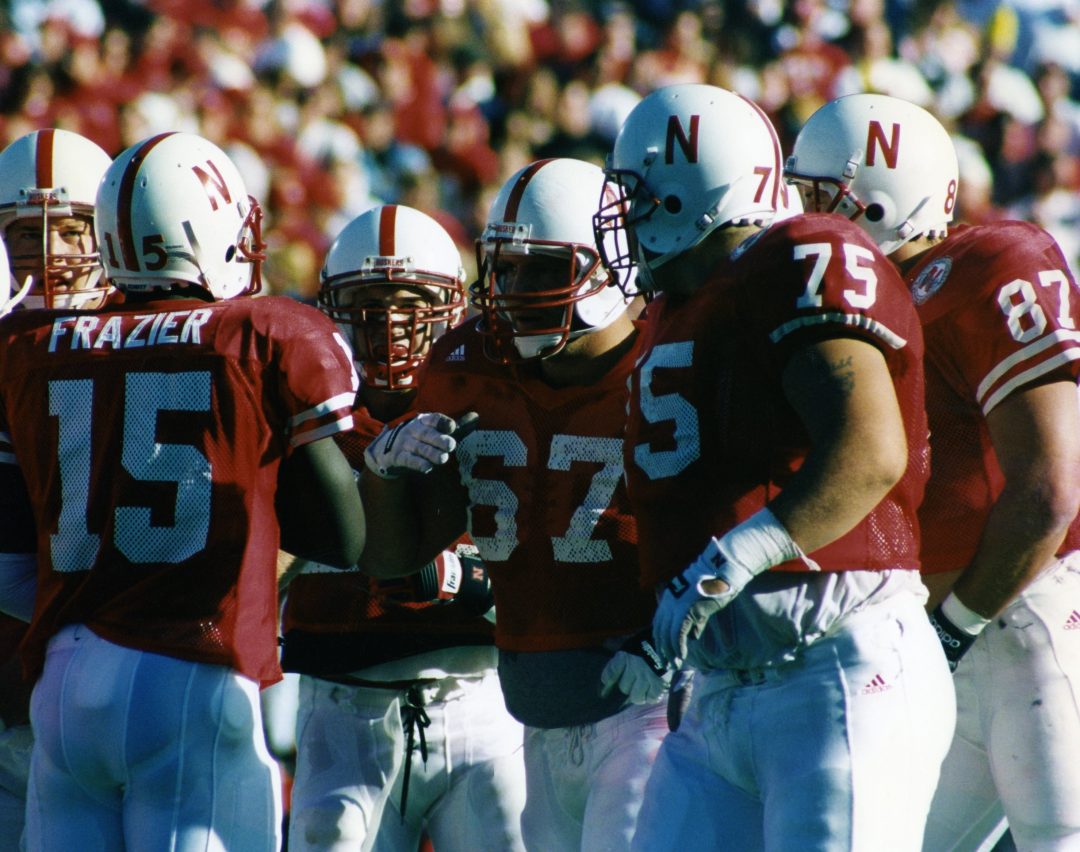
Looking back on it, that was one of the things I remember about Tommie: he wasn’t afraid to speak up and let you know what he felt and what he expected out of you. But you knew what you were going to get out of him each and every time he needed to step up and a play had to be made. And there was no failing, he would just do it. So it became the sort of thing where you were, ‘If he’d do it and he’s gonna ride my ass, I better do it.’
Q: Recollections of Brook Berringer?
AT: Brook? Just a great guy. In the locker room? Great personality. Him and I liked to do a lot of the same stuff: hunt and fish and do the outdoor things. Gosh, just sitting at the training table with us just BS-ing after we ate, a group of guys.
What I remember about his playing was that every time he came into the ballgame it seems like we always went down and scored. Always. Whether that was the case or not, it’s just what my perception was. A great leader, but a different type of leadership. He was more one of the guys, but still expected a lot out of you. And the big thing I admire about him was where he was second string and stuck in a tough situation. He never let it get him down and never let if affect his ability to go out and perform.
Q: Character?
AT: Character. That’s exactly right. And that’s a tough thing to do. And he not only did it, he exceeded it.

Available on Amazon.com
Q: You had Frosty for a quarterback, too…
AT: And I had Frosty, who I think was actually the best option quarterback we ever had. I don’t think he was the best, say, quarterback or best talent or anything like that, but as far as running the option I don’t think there was anyone better than Scott Frost.
And the reason I say that? He was tough, he was big, he was strong, and he knew exactly… hey, there were many times Scott Frost would get blown up or deliver a blow, but he knew how to run that option so well that he would take it right to the pitch man. A lot of times Tommie Frazier would rely on his athletic ability instead of pitching it out to Calvin Jones or Lawrence or whomoever, he would take it on himself. He might break a big play or not, but Scott Frost would actually run the play out like it was designed. So it’s just a real interesting thing that I felt made him the better option quarterback. Not necessarily the most athletic quarterback or the best breakaway quarterback -like an Eric Crouch- or as dynamic a player as Tommie Frazier was, but as a straight option quarterback I don’t think there was anyone better.
And tough! Just tough as nails. There were times I would pick him up off the ground and he was seeing stars. And the receiver -whether it was Lance Brown or Jeff Lake or somebody- would run in the play, they would actually have to call the play in the huddle and Scott would just give the snap count. And I remember thinking, ‘How the hell is he going to run this next play?! He’s out of it!’ And he’d do the same damn thing. Just absolutely amazing, Paul. You just go, ‘Wow!’
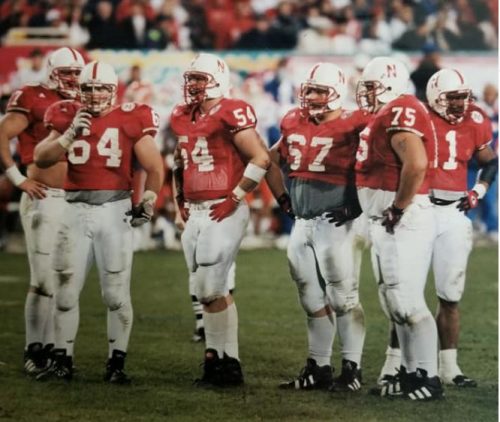
Q: Who would you spotlight as playing a key role behind the scenes? Someone who never got their due for what they contributed?
AT: Well, that’s easy: strength coach Bryan Bailey. That’s an easy one for me.
Q: Why?
AT: Just my perception of Bailey? God, I wish he was still here, big time. He was always there. Always there. Whether you came at six o’clock in the morning or stayed ’til 8 at night, he was always there. And you might have a different perception because you worked with him side by side. But as a player? He was always there, he was always willing to listen to you bitch or moan. He was always pushing you to get better in the weightroom. There was no one else I worked out with.
I don’t know why, and it was just kind of a weird deal. I didn’t work with (Kevin) Coleman or anybody else, or Big John Archer. (Where the hell’s Archer at anyway? He was always a pretty good cat.) I don’t know, but I always worked out with Bailey. He always had something quirky or -I call it innovative– that he was working on. So he got you out of the boredom that can be working out and shook it up but still remained true to the core principles of what we were trying to do, trying to accomplish.
And I think he had the trust of a lot of players. And that was really important. He wasn’t the head strength coach that you had to stay away from, he wasn’t the head coach that you had to stay away from, he could be one of the guys that you go to to talk about your family, how bad practice sucks or any of those things. He’d sit there and listen to you, but yet he’d still make you, in some roundabout way, get a good workout in when you didn’t want to.
Q: He was ‘punishingly accessable’?
AT: Yeah, there you go. (laughs)
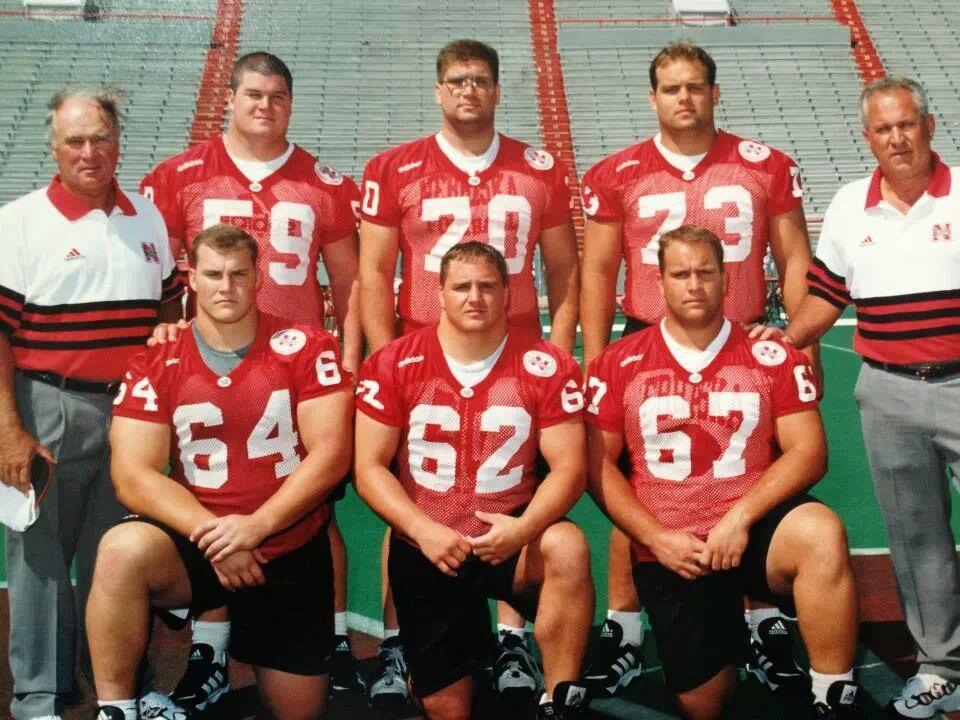
Aaron Taylor #67 (lower right)
Q: It surprises me, Aaron, how many times I hear Bryan’s name. I’m lucky to count him as a great friend, so it’s nice to hear how you guys appreciated him.
AT: Yeah, and Boyd was in his own little world. Even though I like Boyd, he was in his own little universe. And that’s another thing, how many little dynamics were there in that whole strength staff. You had you, Mike Arthur, Randy Gobel, John Archer, Kevin Coleman…
Q: And this skinny little redheaded guy from Arnold, Nebraska coming up with the craziest, most outlandish things to do, right? And the next thing you know you’re running without that ‘hitch in your giddyup’, right?
AT: What a deal. So many different dynamics, but there was still a common work ethic for a common cause.
Q: And hey, come to think of it, you earned a spot on the Record Platform, right? Didn’t you hold the Performance Index record for 10 yard dash?
AT: Yeah, 10 yard dash, hang cleans, and I think I was up there for squats, too.
Q: Well, is there anything else to touch upon that really made Nebraska special during those days?
AT: Well, in conclusion, I would say it was really the fans that made it what it was all about. There’s nothing better than playing in front of Nebraska fans; whether it was the expectation of winning or just the great history of the excitement of gameday. And here we are over 300 sellouts, and it’s just because of the great fans.
End conversation.
I have one question for starters: Who made who? Was it Jason Peter who made Aaron Taylor the best of his class or did Aaron Taylor first draw out in Jason Peter the same effect? Can you imagine the number of reps and rips and bruises and battles between the two throughout those five college years? Talk about symbiosis; it was steel sharpening steel. I plan to track down Jason for his viewpoint too, and am giddy about hearing his take on the great 60 & 3 era.
Aaron made a great point that I hadn’t previously thought of: the numbers of stellar talent had a smoothing effect throughout the program, leading to no one ‘superstar’ to cannibalize the hype, the public’s focus, never allowing one overriding ego to run amok -to the detriment of team unity. They were their own built-in system of checks and balances, “You take a look at all those guys, you never had one star. You had a bunch of stars. And what that did, everybody just kind of came together and was on the same level.”
On the other end of the spectrum, with that came the home-grown walk-ons and scout team scrubs pushing everyone from the depths, resulting in a pressure-cooker environment where every man was constantly looking over his shoulder, pushing himself to seek constant improvement and expend full effort, along with the unified culture, ”.. it just fostered great communication, great commitment, a great work ethic that created a synergy. The synergy that created, you’re going to accomplish much more than what that group should normally accomplish.” The one main point here, the key that cannot be missed if you are wanting an early answer to the great Why and How of the 60 & 3 is this: Competition led to respect. Respect led to synergy. Synergy led to team-wide perseverance. Perseverance led to victories.
Thereby endeth today’s lesson. Class is dismissed.
Notable quote #2:
Aaron Taylor on gaining the crucial physical/psychological edge: “Tenopir always taught that you always get the first lick in. Always put that doubt in their mind first.”
Copyright @ 2013 Thermopylae Press. All Rights Reserved.
Photo Credits : Unknown Original Sources/Updates Welcomed